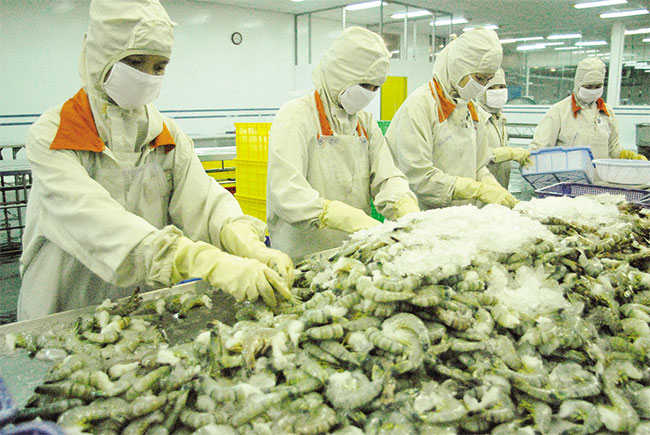Vietnam-EU FTA opens new doors for German trade

Germany’s demand for Vietnam’s seafood products is on the rise Photo: Hoai Nam
Bui Huy Son, director general of the Vietnam Trade Promotion Agency under the Ministry of Industry and Trade, revealed that “Vietnam and Germany are seeing huge opportunities to effectively exploit each other’s potential. The Vietnam-EU Free Trade Agreement (Vietnam-EU FTA), which is expected to be signed by the end of the year, would further facilitate co-operation between the business communities of both countries.”
Germany is now Vietnam’s biggest European trade partner, as the two-way trade turnover amounted to nearly $8 billion in 2014, more than 20 per cent of Vietnam’s overall trade with the EU. Furthermore, Germany is also among the biggest official development assistance donors to Vietnam and serves as a gateway for Vietnamese products to penetrate and expand markets in other countries in the region.

In recent years, many of Vietnam’s goods have managed to gain a strong foothold in Germany, including seafood, garments, furniture, coffee, plastics, leather, footwear, and electronic products and components.
In the last three years, Germany has consistently seized the top position in the EU and second place globally, following just behind the US, in importing Vietnamese tuna, according to the Vietnam Association of Seafood Exporters and Producers (Vasep).
Vasep predicted that Germany’s demand for seafood products, particularly canned tuna, will be on the rise, along with Vietnamese fruit, like bananas, mangoes, oranges, grapes, apples, and peaches.
Benno Bunse, chairman and CEO of Germany Trade & Invest, a state-run economic development agency, also predicted that, “If an FTA between Vietnam and the EU is concluded in the future, it will foster trade.”
The Vietnam-EU FTA will eliminate nearly all tariffs (over 99 per cent ), except for a small number, the partial liberalisation of which the EU and Vietnam have agreed to conduct through zero-duty Tariff Rate Quotas (TRQs). Vietnam expects to liberalise 65 per cent of its import duties on EU products arriving to Vietnam as soon as the agreement comes into force, with the remainder of duties being gradually eliminated over a 10-year period, according to the European Commission.
Moreover, Bunse added that the economic development of Vietnam would lead to an increased volume of trade, especially with Germany. Vietnam has set the goal to finish industrialisation by 2020, which necessitates further substantial investment to modernise and purchase more machinery and equipment to reach this goal.
“As Germany is a leader in supplying world-class machinery and equipment for industrialisation and modernisation, I think many Vietnamese firms will choose to buy German-made machinery and equipment,” he said.
According to Vietnam’s General Department of Customs, in 2006, the total two-way trade turnover between Vietnam and Germany reached $2.36 billion, of which $1.45 billion came from Vietnamese exports. By 2011, the total two-way trade turnover climbed to $5.54 billion, a 2.3-fold rise over 2006, with Vietnam’s exports to Germany reaching $3.37 billion, up 41.9 per cent compared to the previous year.
Son added that to further strengthen trade links, Vietnam and Germany had signed a number of agreements on investment encouragement and protection, maritime and aviation cooperation, as well as the avoidance of double taxation, with a view to creating a firm legal foundation for broader economic ties.
According to Son, a series of workshops will also be organised in the framework of the Vietnam Goods Week, similar to the “Vietnam Goods Week in Metro Cash & Carry Germany” hosted in 2014 in Berlin’s Friedrichshain, which is considered a further step to penetrating the demanding European market.
However, Son stressed that strict German laws forced businesses to pay due attention to three export standards—quality, hygiene and safety, and social responsibility.
“If Vietnamese businesses are capable of meeting the stringent German regulations, then penetration into other European markets is within reach,” Son said.
What the stars mean:
★ Poor ★ ★ Promising ★★★ Good ★★★★ Very good ★★★★★ Exceptional
 Tag:
Tag:
Related Contents
Latest News
More News
- Two national hospitals expand capacity with new facilities (December 20, 2025 | 09:00)
- Ha Tinh breaks ground on major Vingroup industrial and energy projects (December 19, 2025 | 18:24)
- EVN launches major power infrastructure projects nationwide (December 19, 2025 | 18:17)
- VAL inaugurates second production line to meet domestic animal feed demand (December 19, 2025 | 16:37)
- Sun Group pioneers urban tram system in Phu Quoc (December 19, 2025 | 15:00)
- Seven major projects launched to drive Hanoi’s next growth phase (December 19, 2025 | 14:00)
- Securing capital and efficiency for Vietnam’s 2026-2030 growth ambitions (December 17, 2025 | 10:00)
- Vietnam bucking trend in the global M&A landscape (December 16, 2025 | 14:20)
- HDS Summit spotlights Vietnam’s rising role in regional supply chains (December 16, 2025 | 08:00)
- Kolon signs $48 million airbag supply deal with Autoliv (December 15, 2025 | 18:14)























 Mobile Version
Mobile Version